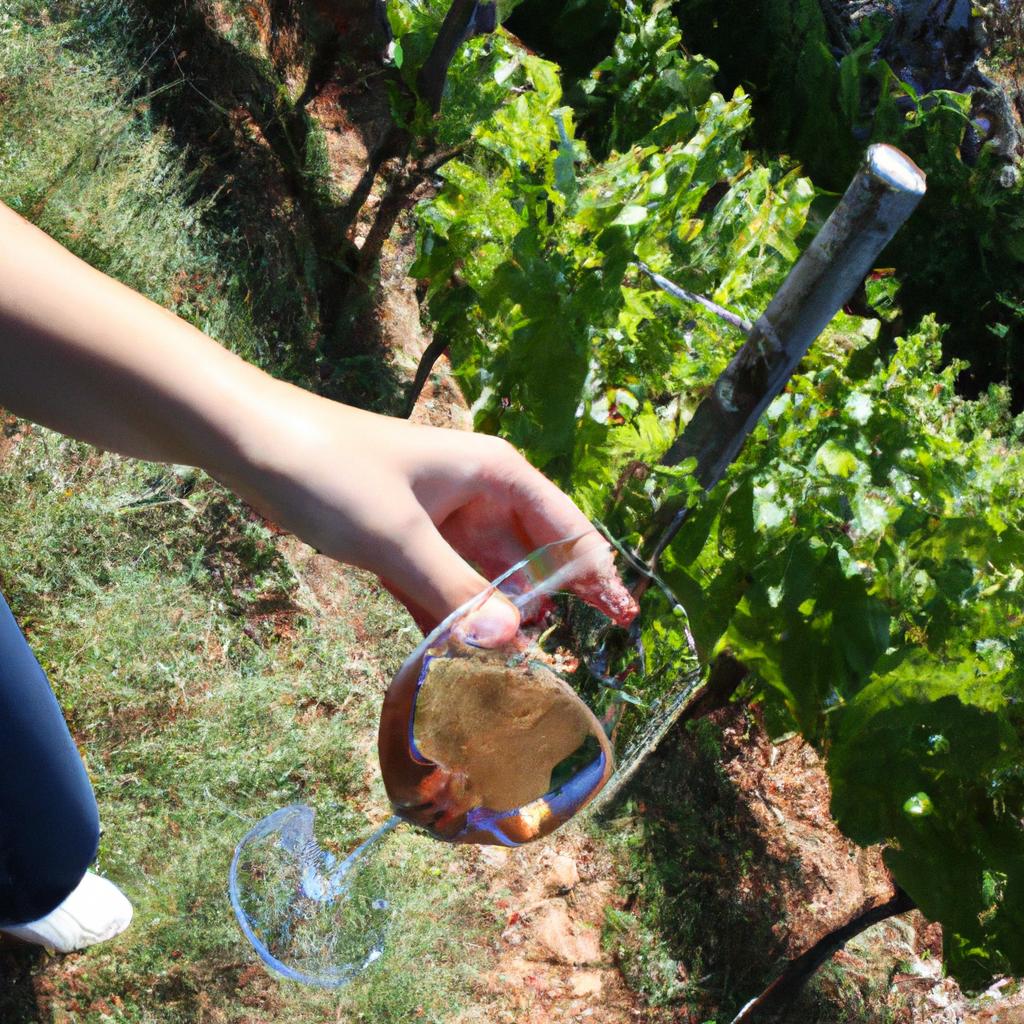Farm-to-Table Experiences: Destinations Events > Food and Wine Tours

Farm-to-table experiences have become increasingly popular among food enthusiasts and travelers seeking authentic culinary adventures. These experiences go beyond simply enjoying a meal at a restaurant; they allow individuals to connect with the origins of their food, interact with local farmers, and gain a deeper understanding of sustainable farming practices. For instance, imagine visiting a picturesque vineyard nestled in the rolling hills of Tuscany, Italy. As you stroll through rows of vibrant grapevines under the warm Mediterranean sun, an experienced sommelier guides you on a tour that unveils the intricate process behind producing exquisite wines. This immersive experience not only indulges your taste buds but also offers insights into the meticulous craftsmanship involved in creating each bottle.
Such farm-to-table experiences are often highlighted by destination events such as food and wine tours. These curated tours take participants on a journey through various regions known for their rich agricultural heritage, providing them with opportunities to explore local farms, wineries, and artisanal food producers. By engaging directly with those who cultivate and harvest the ingredients used in their meals, travelers gain firsthand knowledge about sustainable agriculture and organic practices. Moreover, these tours foster connections between consumers and producers, fostering appreciation for locally sourced products while supporting small-scale farmers and businesses.
In this article, we will explore the rise of farm-to-table experiences and how they have transformed the way people approach food and travel. We will delve into the benefits of these immersive culinary adventures, both for individuals seeking authentic experiences and for local communities striving to promote sustainable farming practices. Additionally, we will provide insights into how travelers can plan their own farm-to-table experiences and make conscious choices that support local economies and ecosystems. Whether you’re a food enthusiast or a curious traveler, this article will inspire you to embark on your own farm-to-table journey and discover the beauty and flavors of the world’s bountiful agricultural landscapes.
The Farm-to-Table Movement: Understanding its Origins and Importance
Imagine dining at a picturesque farm nestled in the heart of the countryside, surrounded by lush greenery. As you savor each bite, you can’t help but wonder about the journey your food has taken to reach your plate. This experience encapsulates the essence of the farm-to-table movement, which seeks to establish a direct connection between farmers and consumers. In this section, we will delve into the origins and importance of this movement that has gained considerable momentum in recent years.
The roots of the farm-to-table movement can be traced back to individuals who sought to challenge conventional agricultural practices and reconnect people with their food sources. One notable example is Alice Waters, renowned chef and advocate for sustainable agriculture. Through her famous restaurant Chez Panisse in Berkeley, California, she pioneered a new approach that emphasized using locally sourced ingredients from nearby farms. This concept not only celebrated regional flavors but also promoted environmental stewardship and supported local economies.
To fully appreciate the significance of the farm-to-table movement, it is essential to understand its underlying principles. Here are four key aspects that highlight its importance:
- Sustainability: By promoting local sourcing and reducing food miles (the distance food travels from producer to consumer), the farm-to-table movement contributes to a more sustainable food system.
- Seasonality: Emphasizing seasonal produce ensures fresher ingredients while supporting crop rotation and biodiversity.
- Community Engagement: Encouraging direct relationships between farmers and consumers fosters community connections and strengthens local resilience.
- Quality Assurance: The transparency associated with knowing where one’s food comes from increases trust in the production process and allows for better control over quality standards.
In addition to these fundamental principles, it is worth noting some common benefits experienced through engaging with farm-to-table initiatives:
| Benefit | Description |
|---|---|
| Enhanced Flavor | Locally grown produce tends to be picked at its peak ripeness, resulting in superior taste and flavor. |
| Environmental Preservation | By minimizing the carbon footprint associated with long-distance transportation, farm-to-table practices contribute to environmental conservation. |
| Economic Support | Directly supporting local farmers and artisans helps sustain rural communities and promotes economic growth. |
Understanding the origins and importance of the farm-to-table movement provides a solid foundation for exploring its connection to sustainable farming and local cuisine. By embracing these principles and engaging with this movement, we can enhance our dining experiences while actively contributing to a more sustainable future.
Next, let’s delve into how sustainable farming practices intertwine with creating delectable dishes that celebrate regional flavors.
Exploring the Connection Between Sustainable Farming and Local Cuisine
The farm-to-table movement has not only revolutionized how we approach food consumption, but it has also fostered a deeper connection between sustainable farming practices and local cuisine. This connection is evident in various ways, one of which can be seen through the collaboration between farmers and chefs to create unique culinary experiences that celebrate fresh ingredients.
For example, consider a hypothetical case study where a renowned chef partners with a nearby organic farm. The chef visits the farm regularly, selecting the freshest produce for his restaurant’s menu. By forging this direct relationship with the farmer, the chef ensures that he receives high-quality ingredients while simultaneously supporting sustainable agricultural practices. This partnership allows him to offer his customers an authentic farm-to-table dining experience.
To further highlight the significance of this connection, let us delve into some key aspects of sustainable farming and its impact on local cuisine:
- Environmental benefits:
- Reduced carbon footprint due to shorter transportation distances
- Preservation of biodiversity through responsible land management
- Decreased reliance on synthetic pesticides and fertilizers
- Promotion of soil health through organic farming techniques
This table provides a visual representation of these environmental benefits:
| Environmental Benefits |
|---|
| Reduced Carbon Footprint |
| Preservation of Biodiversity |
| Decreased Reliance on Synthetic Pesticides and Fertilizers |
| Promotion of Soil Health |
In addition to environmental advantages, there are social and economic implications as well. Supporting local farmers stimulates regional economies by keeping money within communities. It also fosters community engagement by connecting consumers directly with those who grow their food. Furthermore, promoting sustainable farming methods helps ensure future generations will have access to nutritious foods while preserving natural resources.
As we continue our exploration into farm-to-table experiences, it becomes apparent that these connections extend beyond mere transactions. They represent a shared commitment towards sustainability and gastronomic excellence. In the subsequent section, we will embark on a culinary journey through fresh ingredients, discovering the magic that unfolds when farm-fresh produce meets skilled chefs in Farm-to-Table Experiences: A Culinary Journey Through Fresh Ingredients.
Farm-to-Table Experiences: A Culinary Journey Through Fresh Ingredients
Imagine stepping into a picturesque farmland with rolling hills, where rows of vibrant produce sway gently in the breeze. You are greeted by enthusiastic farmers who proudly showcase their organic crops, explaining how they have nurtured the land to ensure sustainable farming practices. This immersive experience is just one example of farm-to-table tours that offer an opportunity to explore the connection between sustainable farming and local cuisine.
These farm-to-table experiences provide individuals with a unique culinary journey through fresh ingredients sourced directly from nearby farms. By participating in these tours, participants not only gain insight into sustainable food production but also engage in a deeper understanding of the importance of supporting local agriculture. Through this experiential learning, people can witness firsthand how their food choices impact both their health and the environment.
To fully grasp the significance of sustainable farming and its relationship to local cuisine, consider the following emotional responses evoked by such experiences:
- A sense of awe: Being surrounded by lush fields bursting with colorful fruits and vegetables sparks a feeling of wonder for nature’s bounty.
- Nostalgia for simpler times: Observing traditional farming methods may transport visitors back to a time when communities relied on locally grown produce for sustenance.
- Gratitude towards farmers: Witnessing the dedication and hard work put forth by farmers cultivates appreciation for those who labor tirelessly to bring wholesome food to our tables.
- Empowerment through knowledge: Learning about sustainable agricultural techniques empowers individuals to make informed decisions regarding their own dietary choices.
Table: Emotional Responses Evoked by Farm-to-Table Experiences
| Emotional Response | Description |
|---|---|
| Sense of awe | Marvel at nature’s abundance showcased in bountiful fields |
| Nostalgia | Reflect on simpler times when communities thrived on locally grown produce |
| Gratitude | Appreciate farmers’ efforts in providing nourishing food |
| Empowerment | Gain knowledge to make informed choices for personal well-being and the environment |
As more individuals participate in farm-to-table experiences, their awareness of sustainable farming practices grows. This heightened understanding often motivates them to seek out local produce when making everyday food choices. By doing so, they actively support farmers who prioritize environmentally friendly methods while also embracing a healthier and more flavorful dining experience.
Transitioning into the subsequent section about “The Role of Farmers Markets in Promoting Farm-to-Table Practices,” we delve deeper into how these vibrant community spaces contribute to sustaining the farm-to-table movement.
The Role of Farmers Markets in Promoting Farm-to-Table Practices
Farm-to-Table Experiences: Destinations Events > Food and Wine Tours
In the previous section, we explored the concept of farm-to-table experiences and their significance in providing a culinary journey through fresh ingredients. Now, let us delve deeper into the role of these experiences as destinations events, particularly focusing on food and wine tours. To illustrate this further, let’s consider an example:
Imagine embarking on a food and wine tour in Napa Valley, California—one of the most renowned regions for its vineyards and agricultural abundance. As you traverse picturesque landscapes adorned with rows of grapevines and bountiful farms, you have the opportunity to witness firsthand how local ingredients are cultivated sustainably and transformed into delectable dishes.
Food and wine tours provide individuals with immersive experiences that engage all senses. They allow participants to connect with nature, appreciate regional specialties, and gain insights into traditional farming practices. Here are some key aspects that make these tours truly captivating:
- Culinary expertise: Expert guides accompany visitors throughout the tour, sharing knowledge about local cuisine, winemaking techniques, and pairing recommendations.
- Farm visits: Participants get to visit farms where they can interact directly with farmers, learn about organic farming methods, and even harvest seasonal produce themselves.
- Tastings: The highlight of any food and wine tour is undoubtedly the tastings—sampling handcrafted wines at vineyards or savoring freshly prepared meals made from locally sourced ingredients.
- Cultural immersion: These tours often incorporate cultural elements such as music performances or art exhibitions that celebrate the region’s heritage alongside its culinary offerings.
To better understand the impact of food and wine tours as destination events facilitating farm-to-table experiences, consider the following table showcasing potential emotional responses evoked during such excursions:
| Emotion | Example Scenario |
|---|---|
| Excitement | Discovering unique flavor combinations during a tasting |
| Awe | Witnessing the meticulous craftsmanship of local artisans |
| Satisfaction | Savoring a farm-fresh meal prepared by talented chefs |
| Connection | Engaging in conversations with passionate farmers and winemakers |
By fostering these emotional connections, food and wine tours not only create memorable experiences for participants but also contribute to the preservation of traditional farming practices and sustainable agricultural systems. Consequently, they play a crucial role in promoting the farm-to-table movement.
In the subsequent section on “Farm-to-Table Restaurants: Showcasing Local Flavors and Seasonal Menus,” we will explore how restaurants embrace this philosophy to showcase local flavors through their seasonal menus. By doing so, they further enrich our culinary journey towards supporting sustainable agriculture and community development—ultimately strengthening the bond between producers and consumers.
Farm-to-Table Restaurants: Showcasing Local Flavors and Seasonal Menus
Having explored the role of farmers markets in promoting farm-to-table practices, it is evident that these community-oriented spaces play a crucial part in connecting consumers with local growers. However, another avenue through which individuals can delve deeper into the world of sustainable food production and regional gastronomy is by participating in food and wine tours. These immersive experiences offer an opportunity to not only taste delicious dishes but also gain insights into the farming techniques, vineyard management, and culinary traditions unique to each destination.
Case Study: Imagine you find yourself on a food and wine tour through the picturesque countryside of Tuscany, Italy. As you traverse lush vineyards and rolling hills dotted with olive groves, your senses are awakened by the scents of freshly baked bread, ripe tomatoes, and fragrant herbs. You visit organic farms where passionate farmers share their expertise on traditional cultivation methods, showcasing how they contribute to the region’s renowned cuisine. This case study exemplifies how food and wine tours provide an enriching experience for visitors by offering glimpses into diverse agricultural practices while indulging in delectable local fare.
- Discover hidden gems off-the-beaten-path
- Engage with local communities and learn about their cultural heritage
- Support small-scale producers who prioritize sustainability
- Taste authentic flavors directly sourced from nearby farms
In addition to experiencing firsthand the interconnectedness between agriculture and gastronomy during food and wine tours, tourists can also deepen their understanding through informative resources. The table below highlights some key benefits associated with these immersive experiences:
| Benefits | Description |
|---|---|
| Cultural immersion | Gain insight into local customs, traditions, history, and art related to food and wine. |
| Sustainability | Learn about environmentally friendly practices, such as organic farming and biodynamic viticulture. |
| Community engagement | Connect with local farmers, winemakers, chefs, and artisans to support the regional economy. |
| Culinary education | Acquire knowledge on cooking techniques, ingredient selection, and pairing wines with dishes. |
As individuals continue to seek authentic experiences that go beyond mere consumption, food and wine tours provide an avenue for travelers to engage with the landscapes they explore while fostering sustainable practices. By actively participating in these immersive journeys, visitors not only contribute to local economies but also develop a deeper appreciation for the interconnectedness of agriculture, gastronomy, culture, and sustainability.
Looking ahead into the next section focused on farm visits and harvest festivals, we will delve into how individuals can further immerse themselves in agricultural activities while celebrating the bountiful harvest seasons without leaving behind their love for culinary indulgences.
Farm Visits and Harvest Festivals: Immersive Experiences in Agriculture and Gastronomy
Transition: Moving away from the experience of dining at farm-to-table restaurants, let us now explore another facet of farm-to-table experiences: Food and Wine Tours.
Food and wine tours offer a unique opportunity for travelers to immerse themselves in local culinary traditions and sample the flavors of a region. These tours often take participants on a journey through picturesque landscapes, visiting farms, vineyards, and artisanal food producers along the way. One such example is the Tuscany Food and Wine Tour in Italy, where participants can indulge in delectable Tuscan cuisine while exploring renowned wineries nestled amidst rolling hills.
These tours not only provide an enjoyable gastronomic experience but also serve as educational platforms that highlight sustainable farming practices and showcase how food goes from farm to table. Here are some key aspects that make food and wine tours a truly captivating adventure:
- Culinary Delights: Participants have the opportunity to savor locally sourced ingredients transformed into exquisite dishes by skilled chefs. From freshly harvested vegetables to succulent meats, every bite tells a story of craftsmanship rooted in tradition.
- Wine Tasting: Guided visits to vineyards introduce visitors to the art of winemaking, allowing them to appreciate different grape varieties and taste wines made with passion and expertise.
- Engaging Workshops: Many food and wine tours incorporate hands-on workshops where participants can learn traditional cooking techniques or even try their hand at making cheese or pasta under the guidance of experienced artisans.
- Connecting with Local Producers: Meeting farmers, cheesemakers, bakers, and other passionate individuals behind these culinary creations fosters a sense of connection between travelers and the people who shape regional cuisines.
To further illustrate the enriching nature of food and wine tours, imagine participating in one set against the backdrop of Provence in France:
| Morning Activity | Afternoon Activity | Evening Activity | |
|---|---|---|---|
| Day 1 | Visit a local olive grove and learn about the production process of extra virgin olive oil. | Explore a lavender farm, discovering its culinary uses as well as its role in perfumery. | Enjoy a sunset wine tasting overlooking vineyards, accompanied by regional cheeses and charcuterie. |
| Day 2 | Join a pastry chef for a croissant-making workshop, delving into the secrets of creating flaky French pastries. | Take part in grape harvesting at a family-owned winery, gaining insight into the intricacies of selecting ripe grapes. | Savor a Michelin-starred dinner showcasing innovative dishes inspired by Provencal ingredients. |
Through this itinerary, participants not only engage with the flavors and aromas unique to each destination but also gain firsthand exposure to the cultural heritage and sustainable practices that underpin these culinary traditions.
In summary, food and wine tours offer an immersive experience that combines gastronomy, education, and exploration. By engaging with local producers, participating in workshops, and indulging in delectable cuisine paired with exquisite wines, travelers can deepen their understanding of both the artistry behind farm-to-table experiences and the regions they visit.





